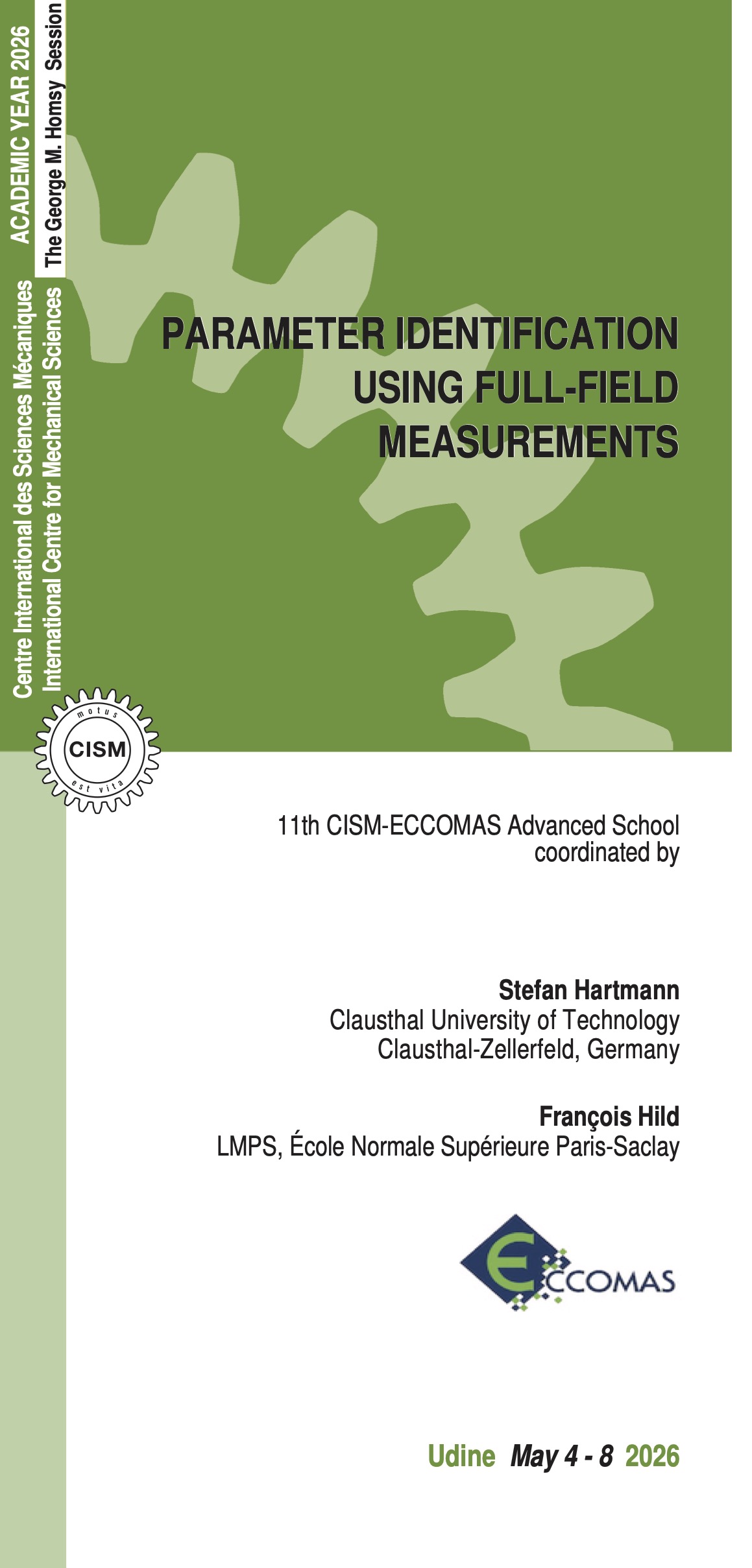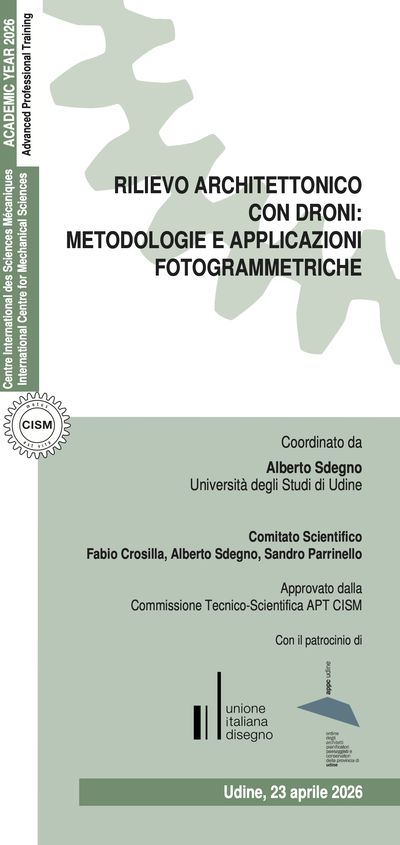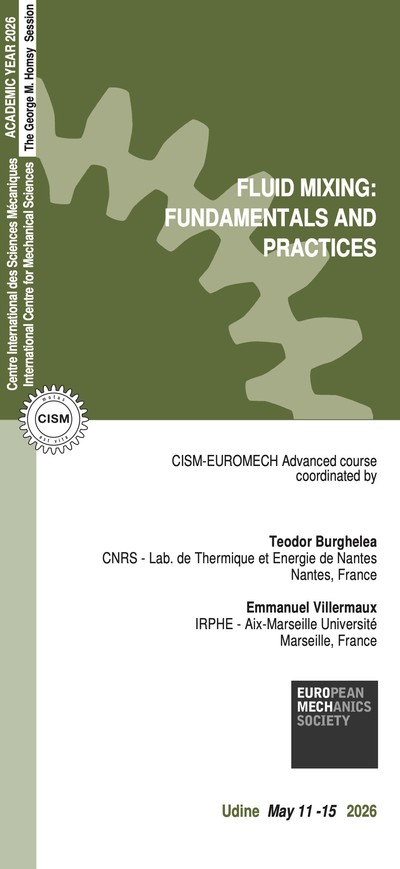Full-field measurement techniques such as digital-image correlation or infrared thermography – and even digital volume correlation – provide spatially and temporally distributed displacement and temperature data. The course covers how camera systems and evaluation algorithms can be used to measure displacements, strains, and temperatures on or inside samples. These experimental data can be used for validation purposes of finite element simulations, or for the identification of material parameters of constitutive models. Therefore, the underlying structure of constitutive models will be addressed in (thermo-)elasticity, viscoelasticity, plasticity, and viscoplasticity, as well as their incorporation into finite element codes. One major focus of the course treats the question of how the material parameters can be determined from given experimental datasets. Different objective functions can be used to identify material parameters by forming minimization problems, for example, the classical least squares formulation, physical-informed neural networks, the virtual field method, and generalizations such as all-at-once approaches. Moreover, this course focuses particularly on the reliability of parameter determination and addresses Bayesian uncertainty quantification concepts to provide indicators of the quality of the parameters determined by some methods. Finally, the influence of the uncertain parameters is taken into account to validate the simulations, where the full-field measurements are chosen to compare – not only optically but defining metrics of deviations – the simulations with the data in the regions of interest.
The course is structured in possible experiments, measurement techniques, design of specimens, full-field measurements, and filtering techniques. Then, the general structure of constitutive models of elasticity and inelasticity and their implementation into finite element programs is provided to solve discretized systems of equations associated with the underlying boundary-value problems to model experimental setups. These equations are treated within various parameter identification approaches (least-squares, neuronal networks, virtual fields method, equilibrium gap method, …). The reliability of parameter identification within both Bayesian and frequentist frameworks, together with the quantification of their associated uncertainties, is systematically examined. The course also addresses current limitations and problems of the approaches resulting from the experimental and theoretical points of view. The last part is devoted to illustrations and practical applications of various concepts introduced during the lectures.
Anton D, Tröger JA, Wessels H, Römer U, Henkes A, Hartmann S (2025) Deterministic and statistical calibration of constitutive models from full-field data with parametric physics-informed neural networks. Adv Model Simul Eng Sci 12(1):12
Batsale J-C, Chrysochoos A, Pron H, Wattrisse B (2013) Thermographic analysis of material behavior. In: Grediac M, Hild F (eds) Full-Field Measurements and Identification in Solid Mechanics. ISTE & Wiley, London
Chen B, Starman B, Halilovč M, Berglund LA, Coppieter S (2025) Finite element model updating for material model calibration: a review and guide to practice. Arch Comput Methods Eng 32:2035–2112
Chrysochoos A, Huon V, Jourdan F, Muracciole JM, Peyroux R, Wattrisse B (2010) Use of full-field digital image correlation and infrared thermography measurements for the thermomechanical analysis of material behaviour. Strain 46(1):117–130
Fedele R (2015) Simultaneous assessment of mechanical properties and boundary conditions based on digital image correlation. Exp Mech 55(1):139–153
Fedele R, Scaioni M, Barazzetti L, Rosati G, Biolzi L (2014) Delamination tests on CFRP-reinforced masonry pillars: optical monitoring and mechanical modelling. Cem Concr Compos 45:243–254
Hild F, Roux S (2025) On the future of experimental mechanics in the digital world: an eikological perspective. Eur J Mech A/Solids 113:105654
Römer U, Hartmann S, Tröger J-A, Anton D, Wessels H, Flaschel M, De Lorenzis L (2025) Reduced and all-at-once approaches for model calibration and discovery in computational solid mechanics. Appl Mech Rev 77(4):040801
Roux S, Hild F (2024) Comprehensive full-field measurements via digital image correlation. In: Silberschmidt V (ed) Comprehensive Mechanics of Materials, vol 2. Elsevier, Amsterdam, pp 3–56
5 lectures on:
Inverse calibration of phenomenological plasticity. This series highlights advances in inverse calibration of phenomenological plasticity models, from the limits of conventional methods to full-field approaches, specimen design, verification, and applications, charting the path to practical engineering tools.
4 lectures on:
The stochastic formulation of inverse problems and its solution by neural networks. The courses cover the stochastic formulation of inverse problems based on the fusion of information, including Bayesian estimation and Kalman filtering, their solution by feed-forward and physics-informed networks, with a practical session in Matlab.
6 lectures on:
Numerical treatment, strain determination, parameter identification and validation. The courses cover constitutive modeling, FEM discretization, parameter calibration with least-squares as well as uncertainty analysis and identifiability, and a strain determination concept for DIC/IRT and concerning applications for validation purposes.
5 lectures on:
Full-field measurements via image correlation. The courses cover advanced experiments calling for full-field data, basic principles of instantaneous DIC and its extension to 3D and 4D measurements, the coupling of FE analyses with DIC, and applications using integrated DIC for parameter identification.
5 lectures on:
Uncertainty quantification for parameter identification in a physics-based or data-driven context. The courses cover frequentist and Bayesian approaches to uncertainty quantification for material parameter identification, sampling and optimization approaches, unifying all-at-once concepts and uncertainty quantification in machine learning approaches.
4 lectures on:
Thermo-mechanical modeling and calorimetric analysis using full-field measurements. The course involves the presentation of a framework for the thermodynamically consistent modelling of complex problems, the experimental determination of energy-related quantities using coupled full-field measurements and their use for model characterization.
ADMISSION AND ACCOMMODATION
The course is offered in a hybrid format, allowing participants the flexibility to attend either in person or remotely via the Microsoft Teams platform. Admission to on-site attendance is granted on a first-come, first-served basis to comply with the capacity of the lecture room.
Registration fees:
- Early Bird On-Site Participation: € 650.00 + VAT* - Deadline: March 4, 2026
- Late On-Site Participation: € 800.00 + VAT* - Deadline: April 22, 2026
- Live Streaming Online Participation: € 250.00 + VAT* - Deadline: April 22, 2026
On-site participation includes a complimentary bag, five fixed menu buffet lunches, hot beverages, downloadable lecture notes.
Online participation includes downloadable lecture notes.
Application forms should be submitted online through the website: http://www.cism.it. A confirmation message will be sent to participants whose applications are accepted.
Upon request, and subject to availability, a limited number of on-site participants can be accommodated at the CISM Guest House for € 35 per person per night. To request accommodation, please contact foresteria@cism.it.
CANCELLATION POLICY
Applicants may cancel their registration and receive a full refund by notifying the CISM Secretariat in writing (via email) no later than:
- March 4, 2026, for early bird on-site participation;
- April 4, 2026, for late on-site participation;
- April 22, 2026, for online participation.
No refunds after the deadlines. Cancellation requests received before these deadlines and incorrect payments will be subject to a € 50.00 handling fee.
GRANTS
A limited number of participants from universities and research centers who do not receive support from their institutions can request a waiver of the registration fee and/or free lodging.
Requests should be submitted by email to the CISM Secretariat at info@cism.it by March 4, 2026. Submissions must include the applicant’s curriculum vitae and a letter of recommendation from the head of the department or a supervisor, confirming that the institute is unable to provide funding. Preference will be given to applicants from countries that sponsor CISM.





